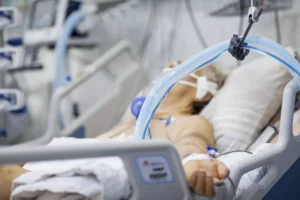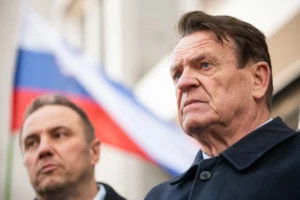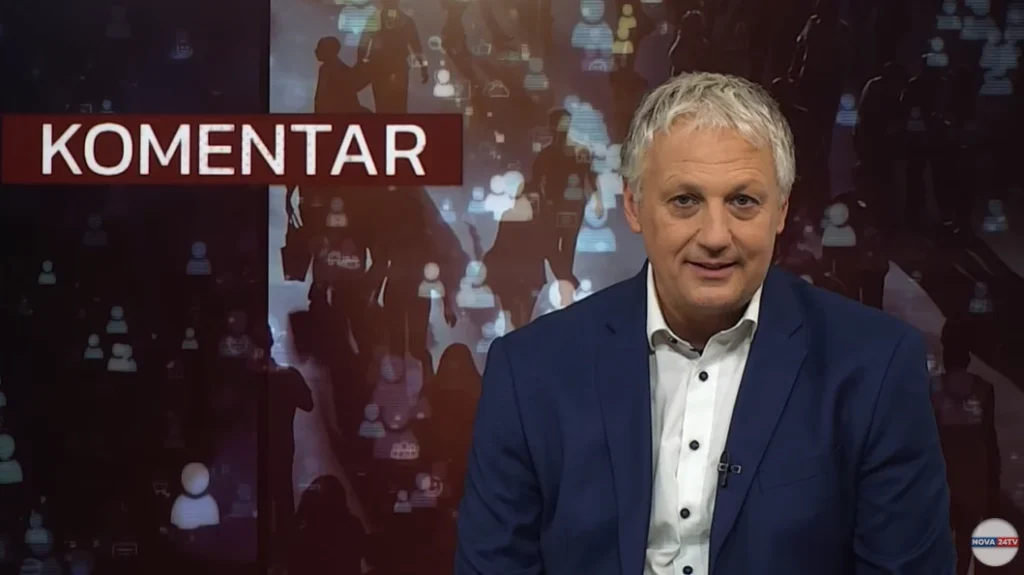“On Monday, we began collecting 40,000 signatures for a referendum opposing the legalisation of the poisoning of patients. Signatures can be submitted at all administrative units and local offices or via computer if you have a digital certificate. The signature submission process is quick and takes only two minutes,” emphasised Aleš Primc from the Voice for Children and Families (Glas za otroke in družine) in his introduction.
In this week’s episode of the show Commentary (Komentar), he shared important information with the public about the collection of signatures for a referendum, not only against the poisoning of patients, but also about fair pension payments and a rally to protect cultural heritage, which will take place on the 4th of September in front of the Ministry of Natural Resources and Spatial Planning.
Aleš Primc, who is also the initiator of the signature collection, explained in the introduction that signatures can be submitted in the following ways:
• At an administrative unit or local office: “When you visit, bring your personal ID and tell the clerk that you want to sign the petition for a referendum against the poisoning of patients. The clerk will enter your details into the computer, and you will sign on the electronic screen, similar to when you receive registered mail. Important: at the end of the process, explicitly request a confirmation of your signature – otherwise, you will not receive it. Keep the confirmation as proof that your signature has been registered.” • Via computer: “If you have a digital certificate, you can submit your signature from home via your computer. In this case, you will also receive a confirmation, which you should save.”
Local offices of the competent state authority are the recommended choice, as they are often less busy and closer to your home.
Why is the referendum important?
According to Primc, the referendum is the last chance to prevent the adoption of a law that would legalise the poisoning of patients. This law, which was supported by a majority in the National Assembly, would, according to its opponents, allow the poisoning of sick and elderly people in their homes, hospitals, or nursing homes – places where they should feel safe. Critics of the law warn that it would lead to so-called “poisoning mobbing,” which would force patients and the elderly to their deaths.
Patients need treatment, pain relief, closeness and compassion, not poisoning, Primc believes, emphasising that medical organisations oppose the law because it would force doctors to act contrary to the Hippocratic oath, which states that a doctor will never harm a patient. Slovenian bishops, the Catholic Church, the Evangelical Church, the Orthodox Church, and the Islamic community of Slovenia have also expressed their opposition to the law. The bishops emphasised that Slovenians need help in respecting the dignity of life, not “help in committing suicide.”

Primc emphasises that for the government, poisoning patients means reducing costs, both in healthcare and in terms of the pension fund, “no matter how beautifully they describe this law, this is what it is really about – money that they want to spend on other things instead of on patients and pensioners. It’s just like during Nazism, when they first introduced euthanasia and poisoned more than 600 Slovenians. The Nazis also dressed up the poisoning of patients in the most beautiful words of mercy and compassion,” he pointed out critically.
By signing the petition for a referendum, we are defending Article 17 of the Constitution of the Republic of Slovenia, which stipulates that human life is inviolable, Primc continued, adding that the law would change an act that is currently defined as a crime punishable by up to five years in prison under the Criminal Code into a “health service.” It is therefore crucial that you contribute your signature in favour of the referendum as soon as possible and stand up for the right to treatment, not poisoning.
Additional initiative: Fair pension calculation
In addition to the referendum against the poisoning of patients, signatures are also being collected for a law proposed by Pavle Rupar and his pensioners’ association. The purpose of this law is to remedy the injustice suffered by men who retired between the years 2013 and 2022, when their pension calculation percentage was significantly lower than that of women who retired in the same period. In 2013, the calculation percentage for men was 57.25 percent, while for women it was 61.43 percent. The equalisation of contribution rates did not occur until 2024. Therefore, we invite you to sign the initiative for fair pension calculation for men for the aforementioned period when submitting your signature for the referendum.

Rally for the protection of cultural heritage
Primc pointed out that on Thursday, the 4th of September, at 8:30 a.m., a rally for the protection of cultural and religious heritage will take place in front of the Ministry of Natural Resources and Spatial Planning at Dunajska 48 in Ljubljana (near the Petrol tower). The rally is being organised because of the oral hearing before the issuance of a building permit for a parking garage under the Ljubljana market, which, according to opponents, would destroy Plečnik’s market, the Ljubljana cathedral, and other historically and culturally significant buildings in Old Ljubljana.
“Ministry officials were criticised at the previous hearing in June for bias and alleged influence from the mayor of Ljubljana. That is why mass participation in the rally is crucial – to show that people oppose the destruction of our heritage. After the rally, you will be able to sign the referendum petition at the nearby administrative unit on Linhartova Street, which is only a five-minute walk away,” he explained.
“If it weren’t for Nova24TV, I would have no idea what was really going on in Slovenia. Nova24TV is by far the most reliable source of information in Slovenia, so it is right that we support it, and above all, that we support our best source of information. Therefore, I ask you to donate your monthly contribution to Nova24TV as soon as possible, if you have not already done so,” Primc added in his commentary.
“In other words, the referendum against the poisoning of patients is a referendum about your life and death, about our life and death. Will we allow the state to decide when each of us will die? It is the state’s job to provide treatment, relief, and assistance, not to decide and force people to choose death by poisoning,” he concluded.
You can watch Primc’s appearance on the show in its entirety (in Slovenian) at the following link: https://youtu.be/n8421ePh22Y
A. H.


